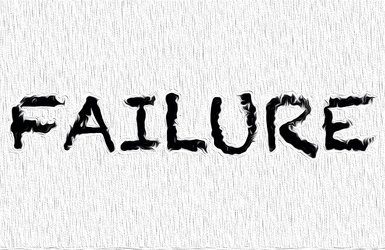“Success is a lousy teacher. It seduces smart people into thinking they can’t lose.” – Bill Gates
Microsoft Co-founder Bill Gates once quipped, “Success is a lousy teacher. It seduces smart people into thinking they can’t lose.” When we succeed, we often think our result is as a result of our actions, but when failure comes around, most of us don’t attribute it to our actions. As motivational speaker Jim Rohn often said, “Success is nothing more than a few simple disciplines, practiced every day, while failure is simply a few errors in judgment, repeated every day. It is the accumulative weight of our disciplines and our judgments that leads us to either fortune or failure. Failure is not a single, cataclysmic event. We do not fail overnight. Failure is the inevitable result of an accumulation of poor thinking and poor choices.” Success and failure are very similar, it is the result of good or bad decisions repeated over a long period of time.
Success is nothing more than a few simple disciplines, practiced every day, while failure is simply a few errors in judgment, repeated every day. – Jim Rohn
Actions have consequences; success is a consequence of repeated good habits, while failure is a result of bad habits repeated over a long period. Success leaves clues, but failure leaves more clues. As author Anthony Robbins once said, “Everybody’s life is either a warning or an example. You’ve got to decide what you’re gonna be, and you have to draw a line in the sand.” We all have a choice of what we want our life to be, a warning or an example, and that decision needs to be made deliberately. One of my favourite things to do in the past couple of years has been reading the autobiographies of the greats. I learnt more about financial acumen from the story of how Mike Tyson mismanaged the over $400 million he learned from his career than from the over 20 books I have read on financial management.

In his memoir, Undisputed Truth: My Autobiography 1, former boxing heavyweight champion of the world, Iron Mike Tyson, writes about the various challenges he had to deal with before getting famous, the curse of fame and his financial mismanagement issues among other addictions. Tyson made over 400 million dollars in his boxing career. However, he lost most of his wealth due to a series of poor financial decisions, drugs, alcohol and sex addiction. In 2003, Tyson filed for bankruptcy with $23 million dollars in debt. He writes:
Once I began making a lot of money boxing, I got a reputation as being a Robin Hood in the hood. People who didn’t know me would make a big deal about me going back to Brownsville and giving my money away. But it wasn’t like that. People who came from where I had come from had a responsibility to take care of their friends even if it was twenty years later. So if I went away and made this money and I went back I had to break off some for my friends who weren’t doing as well. I would pick up cash from Cayton’s office and divide the hundred-dollar bills into packets of a thousand dollars. I’d usually carry about twenty-five thousand in cash with me and would go around and distribute it to my friends when I’d see them. I’d tell them to go buy a tailored suit and then we’d go out that night.
I didn’t even have to know the people who I gave money to. I’d stop my car and give out hundred-dollar bills to bums and homeless people. I’d gather up a bunch of street urchins and take them to Lester’s Sporting Goods store and buy them all new sneakers. I later found out that Harry Houdini did the same thing when he started to make it. I guess that’s what poor people who get rich real quick do. They don’t feel like they deserve it. I felt that way sometimes because I forgot how much hard work I had put into my career.
I guess that’s what poor people who get rich real quick do. They don’t feel like they deserve it.
Black Tax
Black tax refers to money that black professionals and high-income individuals within the black community give to their parents, caregivers, siblings, or other family members as a result of their indebtedness and obligation to their family of origin. Black tax is an issue that a lot of your professionals have to deal with as we usually have to deal with survival guilt of making it out of poverty and tough upbringing. Athletes like Mike Tyson and Scottie Pippen nearly lost everything due to the weight of the black tax. The lessons learned from these famous individuals and my personal experience of being the firstborn child of both my maternal and paternal grandparents placed a lot of burden on me with multiple cousins, nephews and nieces. I have had my fair share of dealing with the curse of the black tax but the insights and clues left by reading the biographies of individuals such as Tyson and Pippen have shaped my thought process of building generational wealth and financial management.
We learn more from our failures and foibles than from our successes and triumphs.

In his book, Be Useful: Seven Tools for Life 2, former governor of California and action movie star Arnold Schwarzenegger advised “Reframing Failure” as it contains all the pieces of becoming a more holistic human. He writes:
If anything, when you look at it with the right perspective, failure is actually the beginning of measurable success, because failure is only possible in situations where you’ve tried to accomplish something difficult and worthwhile. You can’t fail when you don’t try. In that sense, failure is kind of like a progress report on your path to purpose. It shows you how far you’ve come, and it reminds you how far you still have to go and what you have to work on to get there. It’s an opportunity to learn from your mistakes, to evolve your approach, and to come back better than ever.
Failure is inevitable in a lot of ways. But when it comes to achieving your vision, it isn’t failure you have to worry about, it’s giving up. Failure has never killed a dream; quitting kills every dream it touches. No one who has set a world record, or started a successful business, or set the high score on a video game, or done anything difficult at all that they cared about, has been a quitter. They got to where they are on the back of numerous failures. They reached the pinnacle of their profession, invented world-changing products, achieved their craziest visions because they persevered through failure and actively paid attention to the lessons that failure is designed to teach us.
Failure is inevitable in a lot of ways. But when it comes to achieving your vision, it isn’t failure you have to worry about, it’s giving up
Armenian-American novelist, William Saroyan remarked, “Good people are good because they have come to wisdom through failure. We get very little wisdom from success.” Failure is not a situation that we normally what to deal with but the reality of life is that failure is a pivotal part of success. Overnight success usually takes ten years of deliberate practice, failures, persistence, perseverance, consistency and commitment to achieve a set of objectives.
Meditation
- Daily Calm with Tamara Levitt – Playlist
- It can be hard to release thoughts when they feel magnified and grab our attention. Whenever these sticky thoughts pop up, whatever it is, notice it and let it pass away. It is common to get caught in the habit of rumination as thoughts swirl around our mind; each feels important and all-consuming. But when we take a closer look, it is usually the same thoughts and worries been recycled.
- Our mind is like a radio station that repeats the same five songs. We repeatedly ruminate on the same narrow set of concerns, fears, and fantasies. But once we notice that one of our songs is playing again, we can pause and pull ourselves out of its loop. We can even respond with some humour, acknowledging that it is that sound again, and we can choose to change the station, breaking free from the cycle of rumination.
“Every time we become aware of a thought, as opposed to being lost in a thought, we experience that opening of the mind.”― Joseph Goldstein
- Daily Jay with Jay Shetty – Imposter Syndrome
- Imposter Syndrome is the sense that you don’t belong in a certain setting, that you are not as good or skilled as you’ve been made out to be and that eventually, you would be found out. It is completely normal to feel some uncertainty when you are starting something new or noteworthy.
- To conquer Imposter syndrome: Remind yourself of your wins, accomplishments and experiences. Sometimes, when you feel insecure in an area, it is a sign that there is room for improvement.
Podcast
- Everlane: Michael Preysman | How I Built This with Guy Raz
All the Best in your quest to get better. Don’t Settle: Live with Passion.



Comments are closed.